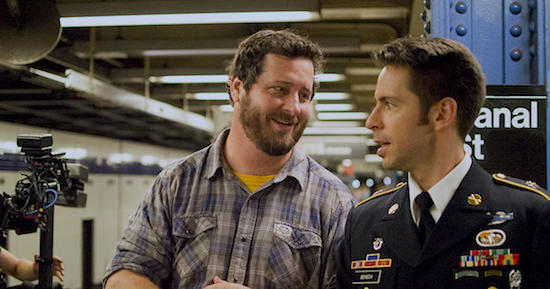
Writer/director Sean Mullin went to West Point and served at Ground Zero in the early days after 9/11. He makes his feature film debut with Amira & Sam, a romantic comedy about an Iraq war veteran who returns home and tries to make sense of a country that seems to have no sense of or connection to the wars it's asking its military to fight. Sean talked to us about his military career, the ideas behind the movie, special forces guys as "buff nerds" and what it's like to pitch military-themed pictures in Hollywood.
The movie is playing in theaters around the country this weekend. If you're into the trailer and really want to support a veteran's movie, you can get yourself to the movie house and buy a ticket. Check this list to see where it's playing. If you don't live in a city that's showing the movie or if you just can't get a sitter to get out of the house, you can also buy or rent it digitally from a long list on online providers (including Amazon Instant Video, Google Play and iTunes). It's even available On Demand from most of the big cable and both of the big satellite providers. They've made it easy for you to see this movie.

Before we get into our conversation with Sean, here's a brief PSA from the director about the "controversy" generated by the film's poster.
We've gotten some backlash from military members and veterans who’ve seen the poster and they know that’s Sam's sideburns are too long for military regulation and they automatically dismiss the film and say, “Oh, I'll never watch his movies because his hair doesn’t conform to military regulations.”
I want to respond to that. The reason his sideburns aren't military-regulation length is because he's out of the military. He's already transitioning into civilian life. He's trying to fit in, so he grew his hair a little longer. He’s asked by his cousin to wear a uniform for an event because he's still on terminal leave. He's allowed to do it, so he kind of begrudgingly does it, but it's one of those gray areas. I feel like if you watch the movie, you’d totally get it as a veteran. No veteran who has seen the movie has pushed back on it to me, but I have had veterans and military personnel who’ve seen advertising for the film or seen the poster who said they won't watch the movie because the sideburns are too long.
Editorial comment: Sam's uneasiness about wearing the uniform to the cocktail party and his cousin's cluelessness about why it might be an issue is one of the strongest things about the movie. It would be nice if the marketing people had a different way to convey "military" on the movie poster, but they didn't really have other options. If the poster bugs you, it's worth getting over it and seeing the movie because Sam definitely agrees with you.
%embed1%
It's nice to see a movie about someone who comes home from war who's not screwed up.
Yeah, that was the whole point. I think every single “veteran comes home from war” movie that’s ever been made is about a veteran with post-traumatic stress, and you know I wanted to tell the first story about a veteran who comes home and he's okay but his country’s lost its mind. But they're the ones grappling with PTSD.

Talk about your own military career.
I graduated from West Point in '97, was an Artillery Officer in Germany for a couple of years. I transferred from active duty to the New York Army National Guard in Manhattan, where I was worked one weekend a month.
I started doing comedy and I started improv theater. There's an improv theater in New York City that was just started around that time called the Upright Citizens Brigade at UCB Theatre. I started working there. After September 11th happened, I was the Plans Officer for Manhattan, so I was put in charge of the soldiers down at Ground Zero. I was a first responder down there and I spent the better part of a year working down as the officer in charge of Ground Zero, where I spent 12 hours a day down there while I did standup comedy at night. It's kind of two worlds colliding with each other, but I think the themes for Amira & Sam were planted down there, rubbing elbows with the Wall Street guys and just hearing all the reactions to the attacks and processing all that at the same time.
I left the military in the summer of 2002, at the five year mark after graduation from West Point. I went to Columbia University to get my MFA in Film Directing. I directed three shorts, all were military-themed. In ’06, I moved out to LA where I've been working as a screenwriter for the past six or seven years, writing for other directors to try and get my first feature off the ground. I knew I wanted to do something that played on both my comedy background as well as my military background.

What were those early days at Ground Zero like for you?
I don’t know where to start, to be honest with you. It was a whole muddle of emotions and experiences and the week was really kind of hectic. We wondered if we were going to be attacked again while we’re cordoning off the area.
My Colonel was the one initially in charge. As things went on, I was put in charge down there and, by the time '02 came around, it turned out to be more showing people around and protecting the area. But the first couple of weeks were pretty intense when were were searching for survivors and even just remains. After a while, more and more people were coming down there, so it was just a matter of making sure that the area was respected.

How did you develop the idea for “Amira & Sam”?
I left the military in summer of '02, before the invasion of Iraq began. I didn’t think we were going to be invading there and I didn’t think a large scale war was going to happen. When it did happen, I was in graduate school. A lot of my friends went off and fought, and most of them came home and they were able to digest or compartmentalize what they did and they were okay.
They just wanted a fair shake. That was the thing I noticed and I wasn’t seeing that reflected in what Hollywood was producing. Can you name a film whose central character is a veteran who comes home who's not suffering from post traumatic stress? I can't. I looked and every single one had to do with a soldier who was wounded with PTSD. There are plenty of soldiers that happens to and it's a horrible, horrible thing. Our suicide rate for veterans is atrocious and all this stuff needs to be addressed and needs to be looked at and understood. At the same time, the majority of veterans who come home from war are able to move on and there are never any films made about them. So that was definitely the driving force.
There's a narrative on both veterans and immigrants that promotes the idea that most veterans are loose cannons. You know the one: every veteran is a loose cannon and every immigrant is a detriment to society. Neither of those narratives are true. I wanted to challenge those perceptions on film and put out a fresh take that had a lot of truth to it.

A lot of the humor in your film comes from Sam's interaction with businessmen and civilians and how clueless they are about what people are up to in military service. Do you think we're in a period in this country now where everyday Americans don’t have any connections to the military?
Absolutely, 100 percent. At no point in American history has so much been asked of so few. Over 99 percent of the population has not served in the military. Since September 11th, less than a percent has. I feel like that military/civilian divide is the real issue here. And my film is aimed squarely at bridging that military/civilian divide.
When Sam comes home from service, the person he most identifies with is an Iraqi immigrant, rather than a fellow American. Have you gotten pushback from anybody who's seen the film?
Well, they're both outsiders and that’s the whole point of the movie. You want to get under xenophobes' skins as much as you want to get under a bigot’s skin or the skin of the liberal who hates veterans or the skin of a conservative who hates immigrants. I’m purposefully getting under the skin of both sides of politics here. At the end of the day, veterans and immigrants are what make up two of the key constituencies in America.

We're talking a lot about politics and humor in your film, but it's also this really sweet, romantic movie. You manage to do all of it at the same time.
That’s definitely the point. I never want to push the politics. It's just, “Hey, these are two people.” Veteran assimulation and immigration are massive, massive complex issues and the best way to tackle the subject for an audience was to pull them down to an intimate love story that has universal implications.
The wars in Iraq and Afghanistan are finally getting a lot of attention from moviegoers because of “American Sniper,” but not everyone in the military is a tip-of-the-spear warrior. The lead character in your movie seems much more connected to the experiences of the vast majority of the people who served.
Not everybody in the military is Channing Tatum. The reason I love the casting of Martin Starr so much is like he's a perfect example of a special ops guy to me because, a lot of my buddies, they're just buff nerds. They're smart, they know how to speak languages, but they're in great shape.That’s why I feel like this is such a great opportunity for Martin to change the perception of veterans.

You’ve managed to make a film that’s getting released in theaters and has a national media campaign behind it. In a business as tough as the movies, you certainly qualify as a guy who’s made it. Do you have any insight or advice for other veterans looking to get into the movie game?
Take all the best skills you learned in the military, you know persistence, leadership, all of that, and align it towards reasonable goals. There's no set structure in the film world, unfortunately, and I feel like a lot of people who come in the military are really looking for like, “Tell me what to do, I'll do XY and Z, and it'll lead to AB and C.” Unfortunately, that’s just not how it works. You just need to keep hustling and keep at it. You want to write and write and direct and direct. You gotta keep doing it until you find your voice as an artist.
It takes time. It's taken me a long time. You know I graduated grad school in ’06 but then I left the military in '02, so you know if you look at it like in a dozen years or so for me to break through. Now I've got five or six projects now in development, all feature projects. A few of them as a writer/director, a few of them as a writer/producer, and about half of them dealing with the military. You just have to keep at it and be persistent. It's really tough to carve your own path, but you just gotta try and do it. Living in LA helped me a lot just because this is where the business is.

Every time we cover a military-themed movie here, there’s a small contingent of commenters who fall all over themselves to post comments about Hollyweird liberals and a show business prejudice against the military. Is that your experience or has the reality been more complicated than that?
There's a disconnect with Hollywood and the military just as much as there’s a disconnect with the average American and the military. I’m originally from Indiana. I'm from The Heartland. Our movie played very well at heartland film festivals across the country, so I consider myself a mix of kind of The Heartland and the coastline. I don’t know, it is difficult to get a military project made.
Amira & Sam was my first film, so I think that’s the bigger issue is that it’s tough to get your first film made. when it's your first film, it's really tough. But you know it was a very positive view of the military. We’ve had a total outpouring of support from veterans' organizations and people who've seen the film. While it is difficult to get anything made in Hollywood, I feel like if there's some authenticity to it, you’ve got a chance. I think what rang true to my investors and some people who got behind the movie is an air of authenticity supported by the fact that I'm a veteran. A couple of our financiers were veterans. You know had either gone to West Point and/or served overseas, so I think the fact that it was written and directed and financed by veterans helps a lot.
Every time I hear that Hollyweird thing, I don’t really know. I just feel like there's an opportunity for anybody to tell their story. Our film was made on a shoestring budget and I had 100 percent creative control over the film. I think Hollywood is more diverse than people think. I'm involved with a few different veteran organizations out here and I've got a nice circle of friends, both West Point grads as well as other veterans. We all kind of look after each other and try to help each other out.




